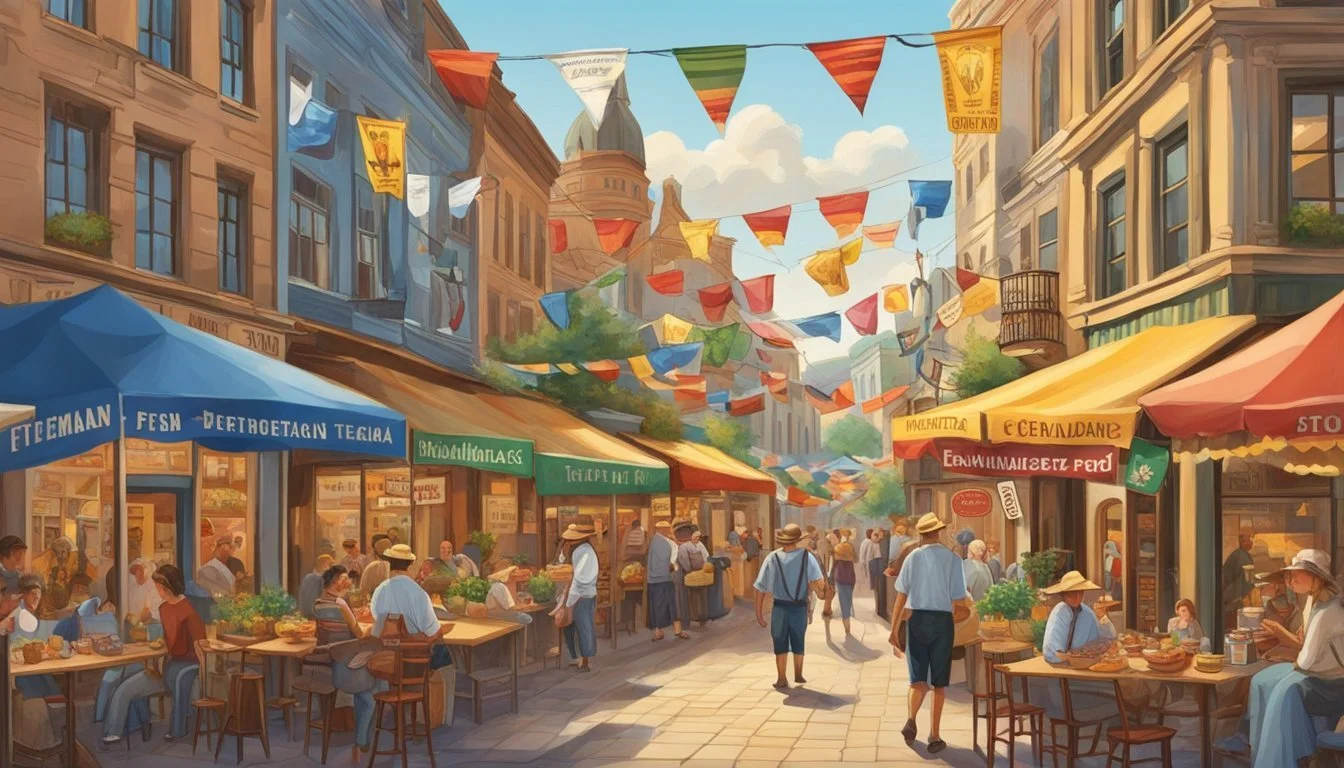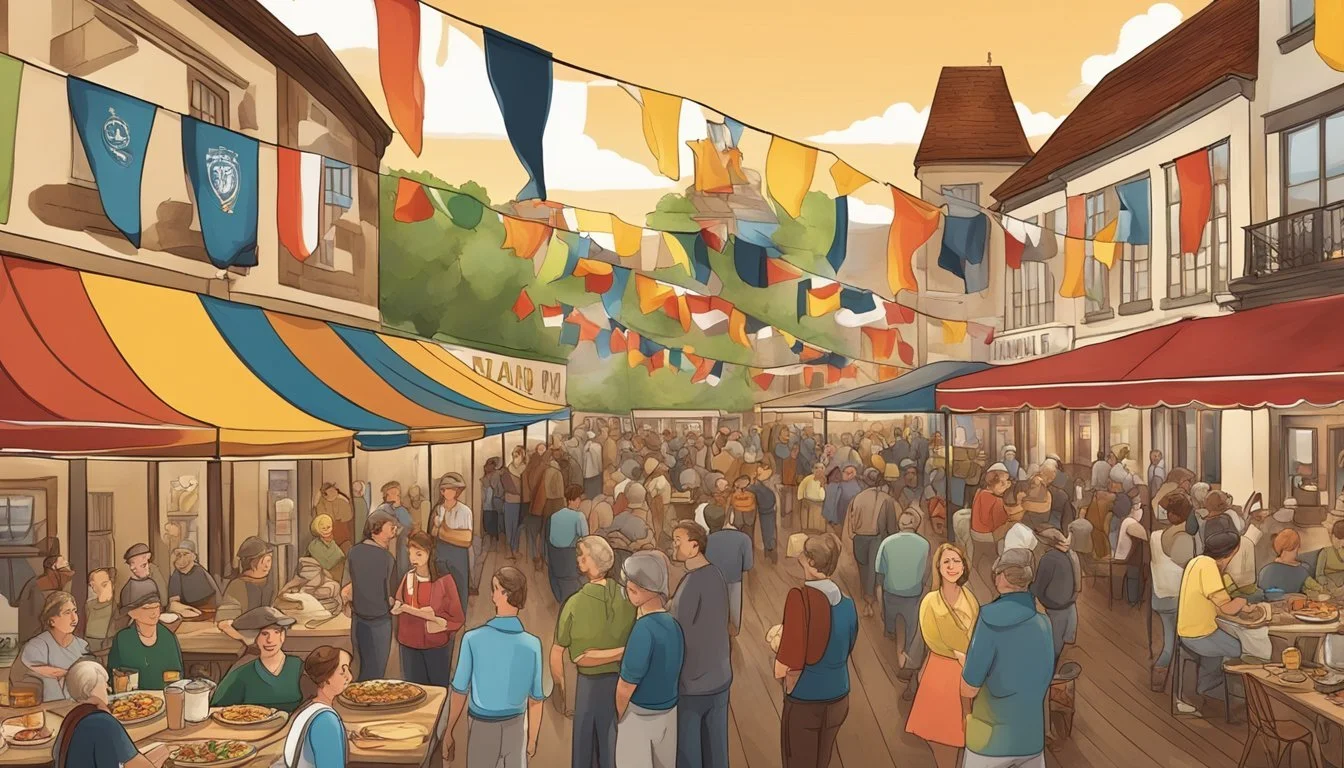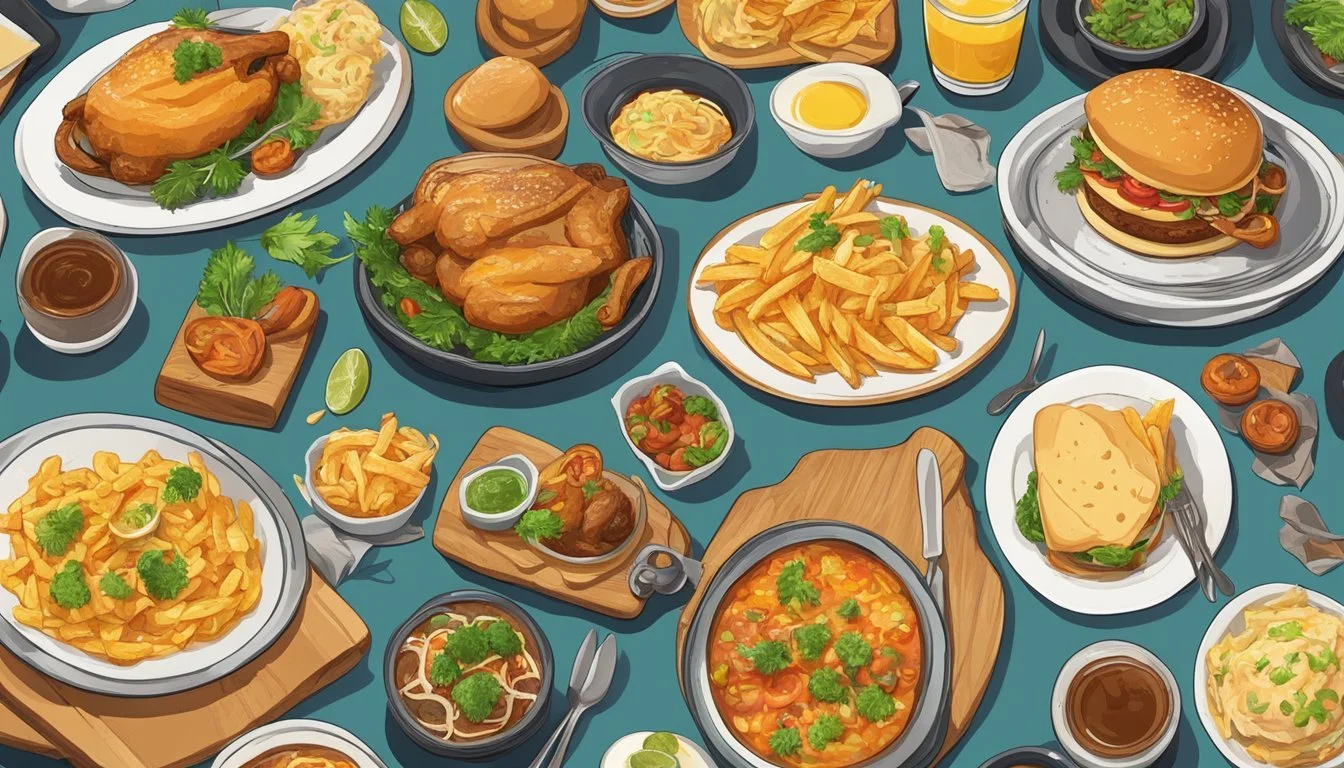German Texan Food and Film Festivals
A Cultural Fusion Showcase
German culture has markedly influenced Texas's cultural tapestry, particularly evident in its culinary and entertainment landscape. German immigrants began arriving in Texas during the 1830s, drawn by land grants in Stephen F. Austin's colony. Over time, these settlers interwove their traditions with Texan culture, giving birth to a unique culinary and festive fusion. Today, German cuisine (What Wine Pairs Perfectly With German Cuisine) in Texas features prominently, with food items like sausages and beers becoming staples at various cultural events, underlining the blend of these two rich heritages.
Food and film festivals in Texas offer a window into the state's German heritage, showcasing its impact across generations. Wurstfest, held in New Braunfels, is illustrative of this blend, attracting over 100,000 visitors who gather to celebrate traditional German fare and revel in authentic festivities. Similarly, the maintenance of German language and historical preservation is a focus of organizations such as the German-Texan Heritage Society (GTHS), which arranges events, including Oktoberfest and German film festivals.
These cultural events not only serve as entertainment but also as educational platforms that highlight the historical connections and continued influence of German culture in Texas. They preserve the German-Texan legacy and ensure that these cultural threads remain an indelible part of the state's identity. Whether through savoring German-Texan food or enjoying the filmic representations of Germany's artistic legacies, these festivals celebrate and sustain a vibrant cultural exchange.
Historical Context of German Influence in Texas
The infusion of German culture into the Texan social fabric began in the mid-19th century and significantly shaped the region's identity. Through successive waves of immigration, German settlers established communities that left a lasting imprint on Texan culture, industries, and language.
German Immigration and Settlement Patterns
In the 1830s, societal and political unrest in Germany led to a wave of immigration to the United States. Texas, with its promise of land, became a prime target for German settlers. Prince Carl of Solms-Braunfels and John O. Meusebach were pivotal in organizing the Adelsverein, which promoted the mass emigration of Germans to Texas. The settlers established pivotal communities in Central Texas, such as New Braunfels and Fredericksburg.
Contributions of German Immigrants
The German immigrants brought with them a wealth of knowledge and traditional practices that greatly influenced local industries. Their expertise spanned from agriculture to the construction of railroads, which was crucial for the state's economic development. They introduced various industries, including brewing and meat processing, thereby diversifying the economic landscape of Texas.
Formation of German-Texan Communities
With the influx of German settlers, distinct communities based on a melding of German and Texan cultures emerged. German settlers played a significant role in founding schools and establishing a strong tradition of education in their settlements. The German Free School in Austin, founded in 1858, exemplified this commitment to education and language preservation.
German-Texan Cultural Preservation
Organizations like the Texas State Historical Association and the German-Texan Heritage Society, established in 1978, aim to preserve this rich heritage. They organize events such as film festivals and Oktoberfest to celebrate and maintain German traditions. The consistent efforts to preserve the German language and culture underscore the depth of the German influence in Texas.
Traditional German-Texan Cuisine
German-Texan culinary traditions mix elements of German heritage with Lone Star flair, offering dishes such as bratwurst and pretzels alongside locally brewed beer and Texas wines.
Characteristic German-Texan Dishes
German-Texan cuisine is known for its hearty and savory dishes. Central to this fare are a variety of sausages, such as bratwurst and weisswurst, often made with pork and veal. These sausages are frequently accompanied by sauerkraut, a fermented cabbage dish. Another classic is schnitzel, a breaded cutlet that's typically made from pork or chicken. Side dishes include spaetzle, a type of soft egg noodle, and potato salad, which vary in recipe from family to family.
German Influence on Texan Brewing and Winemaking
Brewing and winemaking in Texas have strong German roots. German settlers brought with them a tradition of brewing beer, which has evolved into a thriving industry with a diverse range of locally produced craft beers. They also influenced local winemaking, with Texas Hill Country today boasting vineyards that produce wines reminiscent of those from traditional German regions.
Local German Bakeries and Delicatessens
No exploration of German-Texan cuisine is complete without a nod to the region's bakeries and delicatessens. They typically offer a selection of baked goods and desserts, such as strudels filled with apple or cherry, crispy pretzels, and a variety of breads. These establishments also often feature a deli section that serves freshly made sausages, and imported cheeses to complement the local offerings.
Festivals Celebrating German Heritage in Texas
Texas boasts a rich German heritage, best exemplified through its annual festivals. These events, steeped in tradition, offer a blend of authentic German food, music, and celebratory customs.
Oktoberfest in Fredericksburg and New Braunfels
Fredericksburg Oktoberfest celebrates German culture with an array of activities that pay homage to Munich's famous Oktoberfest. Visitors can enjoy oompah bands, local wineries, and a myriad of vendors offering traditional fare. The festival features a charming Weingarten (wine garden), providing a variety of local and imported wines.
In New Braunfels, a town with deeply rooted German ties, Oktoberfest brings together a community-wide celebration. Festive tents mimic Munich's beer halls, and the town square fills with live music, games, and authentic bier.
Live Music: Multiple stages with German and polka bands.
Carnival Rides: Family-friendly entertainment.
Artisans: Craftsmen showcasing traditional German arts.
Wurstfest in New Braunfels
Wurstfest is a ten-day event held in New Braunfels, drawing crowds to celebrate German culture with food, beer, and music. This festival is renowned for its hearty German sausages, lively oompah music, and bustling beer gardens. The festival honors German traditions through various events and performances, often featuring over 200 vendors.
Food: A focus on traditional German sausages.
Beer Garden: A selection of local and German beers.
Music: Authentic German bands and dance floors to enjoy polka music.
Other Seasonal and Regional Festivities
Throughout Texas Hill Country, smaller festivals and seasonal events take place, each with its unique interpretation of German Texan heritage. Spring and Christmas markets mirror those in Germany, complete with traditional goods and holiday treats. Local towns often hold Karneval events, replicating the pre-Lenten festivals common in German-speaking countries.
Spring Festivals: Celebrate the season with German flair.
Christmas Markets: German-inspired holiday markets offering crafts and festive items.
Karneval: A German Mardi Gras with costumes and parades.
Each festival embodies the fusion of Texan and German cultures, creating a unique experience that honors the legacy of German immigrants in Texas.
Influence of German Culture on Texan Arts and Entertainment
German culture has left a distinct mark on Texan arts and entertainment, ranging from music and dance festivals to cinema and architectural landmarks. These cultural elements showcase the rich German heritage embedded in the heart of Texas.
German Music and Dance
In Texas, German music and dance have a strong presence, particularly in the Texas Hill Country, where polka beats and waltzes are often heard at various festivals. The traditional attire such as lederhosen for men and dirndl for women add to the authenticity of these events. San Antonio and Austin are known for their vibrant celebration of Maifest, where one can experience the lively oompah bands and folk dancing reflecting German influence.
Film Festivals Showcasing German Cinema
German cinema is celebrated in Texas through film festivals that highlight German language and culture. Austin's German-Texan Heritage Society promotes such events, where enthusiasts come to appreciate the creativity and storytelling of German filmmakers. These festivals not only screen contemporary German films but also pay homage to classics, providing a window into German culture and history.
Architecture and Historic Sites
German architectural influence is evident in the historic buildings and sites throughout the Texas Hill Country. Towns like New Braunfels and Boerne showcase well-preserved German-style architecture with features like exposed timber framing and ornate woodwork. Scholz Garten in Austin, the oldest operating beer garden in Texas, offers a glimpse into 19th-century German architecture and sustains a cultural gathering place for the community.
Modern German-Texan Communities and Identity
German-Texan communities today continue to retain and celebrate their distinctive cultural identity through language education, robust business contributions, and vibrant cultural organizations and events.
Language and Educational Contributions
German-Texan communities have made significant efforts to preserve the German language, contributing richly to the educational landscape of Texas. Texas German, a dialect developed by German settlers, is taught in various institutions to keep the linguistic heritage alive. For instance, the German-Texan Heritage Society offers language classes that bolster the development and retention of German culture in the state.
Business and Industry
Historically, German settlers in Texas contributed to local economies through farming, ranching, and brewing. Today, towns like Walburg maintain this legacy with their businesses, such as authentic German restaurants and bakeries. These establishments not only strengthen German-Texan identity but also infuse Texan culture with German entrepreneurial spirit.
Notable Contributions:
Authentic German eateries
Traditional German bakeries
Cultural Organizations and Events
The German-Texan Heritage Society and other cultural organizations play a pivotal role in preserving and promoting German-Texan heritage. They organize a range of events including:
Oktoberfest: Celebrates German tradition with food, music, and dance.
German Film Festivals: Showcase films to promote German language and culture.
These events enable communities to maintain a connection to their heritage and share it with the wider Texan population, reinforcing their unique identity within the diverse tapestry of Texan culture.
Conclusion
The fusion of German and Texan cultures has resulted in a rich tapestry of culinary and cinematic experiences unique to the Lone Star State. German-Texans have significantly influenced local traditions, contributing to a vibrant heritage that shines during festivals and in everyday life.
Key focal points of German influence include:
Culinary Delights: Traditional German foods, particularly sausages, are a staple at Texan fests like the renowned Wurstfest in New Braunfels. The authenticity and traditional preparation techniques draw large crowds annually.
Festive Atmospheres: Events such as Oktoberfest celebrated across Texas in places like Muenster and Fredericksburg feature spirited music, dance, and a sense of community that echoes the convivial spirit of German folk festivals.
Cultural Education: Organizations like the German-Texan Heritage Society offer opportunities for further engagement through language classes and film festivals, deepening the public's understanding of German culture.
These elements of German-Texan heritage are not merely historical anecdotes but living traditions that actively contribute to Texas’s cultural diversity. From the tables of local eateries to the vibrant scenes of annual festivals, the enduring influence of German settlers is a cherished aspect of Texan identity, celebrated by residents and visitors alike.








